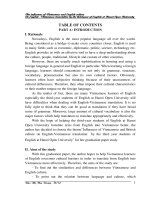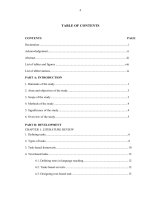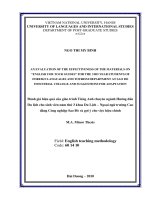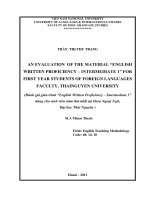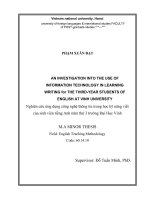What are the possible obstacles discouraging the third year students of foreign languages department from strictly following steps in the essay writing process
Bạn đang xem bản rút gọn của tài liệu. Xem và tải ngay bản đầy đủ của tài liệu tại đây (31.49 MB, 84 trang )
In the time of conducting this study, I have received support, encouragement
and valuable advice from my supervisor, lectures, family and friends.
First of all, I am extremely grateful to Ms. Bui Thi Phuong Thao, my caring and
enthusiastic supervisor for her delication, precious support, invaluable instructions
and reference sources during the development of this project. In fact, my scientific
research would never be completed without her.
Secondly, I would like to express my special appreciation
the Foreign Languages Department
to the whole staff of
for the favorable conditions that help me in
doing my paper.
I, in truth, owe sincere thanks to Ms. Bui Thi Thanh True who always cares
about my theme and spent her busy schedule supplying me with precious advice.
Thirdly, I also express my heartfelt thanks to my family for their spiritual as
well as financial support during my study by far especially for their great support
and constant encouragement
to help me finish this research.
Finally, I sincerely thank all of those responded to the questionaire and interview
on getting opinions together with all of my friends in SA0201.
PHAN THI MINH TAM
Examiner's Comments
Miss Minh Tam has tackled a very difficult subject in her attempt to help
students obtain a proper method of developing the writing skills. She has done a
primary research project and tried to find out what students think about the
factors that discourage them from strictly following the neceesary steps of the
essay writing process.
This is thoughtful work, and'qs very helpful to third- ea
h-yeaI:-students at HUFLIT, who h
rewriting
subjeCt, not only for their
ement but also for fulfulling their graduation examination.
Miss Tam's 'literature review 'part is particularly interesting and useful since it
presents many points of view about the necessities of following the linear model
of the writing process. However, one point should be considered is that 42.8% of
the students involved in the survey expected that teachers should help them revise
their first or second draft. I think that is not a reasonable expectation. Teachers are
expected to look at the final draft for correction because students should learn to
work independently, as Hairston (1998: 19) asserted, 'Students can write well once
they have' developed a set of practices that help them consistently turn out good
work.
This is thoughtful work, and it is very helpful to third- year and fourth- year
students at HUFLIT, who have to master the writing subject, not only for their
own improvement but also for fulfulling their graduation examination.
TABLE OF CONTENTS
ACKNOWLEDGEMENTS
TABLE OF CONTENTS
ABSTRACT
CHAPTER ONE : INTRODUCTION
1
CHAPTER TWO: LITERATURE REVIEW .•.•.........•......•..•................
8
1/ W ri tin g and po w e r
8
21 Writing is a skill that anyone can learn with practice
10
31 Writing - definitions and general features
ll
41 Writing - a process of discovery
14
51 Some distinguishing
language
spe aking
features
between
writing
and
15
6/ The essay writing process
CHAPTER THREE : METHOD
19
26
1/ The description of subjects
26
2/ The instruments
27
al Questionnaire
bl Interview
3/ Procedure
CHAPTER
FOUR : FIND IN"GS
1) Wri ting Process Kn 0 wiedge
28
30
30
2) Students' difficulties consisting of external affections and internal
hardships (from question 4 to question 16)
35
3) Students' attitude toward the essay writing process (from question 17 to
question 20)
49
CHAPTER FIVE: DISCUSSION AND SUGGESTIONS
11 Discussion on the findings of students' knowledge of the stages in the
essay writing process ( from item 1 to item 3.4)
52
21 Discussion on the findings of students' difficulties consisting of external
factors and internal hardship (from item 4 to item 16)
54
31 Discussion on the findings of students' attitudes toward the steps in the
essay writing process (item 17 to item 20)
CHAPTER SIX : CONCLUSIO N
APPENDIX ONE : QUESTIONNAIRE
APPENDIX TWO
REFERENCES
LIST OF QUESTIONS IN THE INTERVIEW
AND INTERVIEWEES' REPLIES
59
63
ABSTRACT
Good command of English is a desire of any foreign language learner
and a profound acquisition of English writing is no exception. According to
Tribble (1996: 43) there are fundamentally
two kinds of English writing.
They are professional writing which is used in society and academic writing
which is used in the school system. Reality has shown that most of EFL
students at Huflit, the third year students in particular,
have had lots of
troubles in making their academic essays. One of the sources of their major
difficulties is their failure to apply the writing process techniques -
the
most significant knowledge associated with a person's writing capability.
Therefore, this scientific research was carried out with an attempt to seek
the possible hindrances discouraging the junior students at HUFLIT from
strictly following the steps in the essay writing process even though they
are supplied with sufficient knowledge about area at school, especially in
the writing class.
In the process of completing this study, a questionnaire was designed
and distributed to seventy-one respondents of HA0302 and HA0303 with a
desire to find out the students' attitudes toward the steps in the essaywriting process and the real obstacles they meet in an effort to apply these
steps. Apart from the questionnaire, an interview with ten other
participants was conducted to get more detailed and relevant information
about this matter. The findings drawn from the questionnaire and the
interview revealed that the pressure of time is a really big problem,
causing those students to flinch from using the writing steps they had been
taught. Moreover, their inability to thoroughly understand the functions of
these steps as well as a shortage of social knowledge, the degree of interest
of the topics in their essay writing materials and teachers' behaviors are
also the main reasons causing their negligent attitudes that process
application.
Due to the limited time, the small number of subjects and issues
explored restricted, the shortcomings are unavoidable. Thus, it is expected
that some other papers about this field will go on with studying this more
deeply so that the students can surely be the beneficiaries of the valuable
results and practical suggestions.
I
Supervisor: BUI THI PHUONGTHAO
CHAPTER!
INTRODUCTION
ILBACKGROUNIl:
The epoch of modern science and technology has integrated
people of different languages into the global community to carry out their
transactions in different fields. Evidently, English has gradually become a
crucial and popular communication tool. Thus, so as to radically master
English or enhance our understanding in such relations, it is essential that
we have good command of four language skills: Listening, Speaking,
Reading and Writing.
A large
number
of English learners,
nevertheless,
have a
mistakenly-held conception that writing is neither an important objective
to achieve nor
an urgent task that is worth our consideration
or an
intensive study. Unfortunately, those people fail to realize the truth that
writing is one of cornerstones of an education, not just for the elite but for
everyone who cherishes an aspiration for obtaining a college degree. It is
obvious that all of us take a lot of benefits from our conscious, good, regular
writing activities:
_We understand material better and retain it longer when we
write about it.
I PHAN THI MINH TAM
1
I
Supervisor: BUI TID PHUONGTHAO
_We generate
new ideas when we write because the act of
writing helps us make connections and see relationships.
_We think more critically when we write. When we get ideas
down on paper, we are more likely to be able to clarify and evaluate them.
With the above benefits that writing brings to us, people studying
English as a foreign language in general and EFL students in particular fail
to cherish a desire to be trained with essentially equipped language tools
and English text composing skills. According to Tribble (1996:67), the most
significant
knowledge
associated
with a person's
capacity
to write
successfully comprises: content knowledge, context knowledge, language
system knowledge, and writing process knowledge.
Besides that, Tribble also expresses his opinion about kinds of
writing. From the viewpoint of Tribble (1996:43) there are basically two
kinds of writing: business writing or professional writing and academic
writing. Professional writing can be said to work in society and academic
writing, on the contrary, in the school system. Therefore
in order to be
good at academic writing, students are supposed to thoroughly acquire the
above mentioned - the four-aspect knowledge.
During the time studying at university, the researcher
has found
out that the third-year students, even the forth-year ones have had to cope
with innumerable
obstacles
in academic
writing, typically in writing
academic essays. This results in an assumption of the researcher
IPHAN TID MINH TAM
that
2
I
Supervisor: Bm TID PHUONGTHAO
university students may be in the shortage of some ranges of knowledge
which must be acquired to become a good writer. After carrying out an
investigation
together
with the trustworthy
graduation papers, the researcher
results from the previous
can come to a certain conclusion that
besides the lack of content knowledge, context knowledge , and language
system knowledge, university students also seem to show a negligent
attitude
toward
writing process application.
conducting an academic writing task
Such process applying to
is considered
as a prerequisite
element. In other words, they possibly have a disposition of not strictly
following the steps in the essay writing
process
although
they are
adequately conveyed the knowledge about this.
From the viewpoint of Tribble, though writing process knowledge is
not so important as the other three elements, it is still an essential part. We
can not deny that a right method is extremely necessary for whatever we
do and writing is no exception. Hence, so as to create a perfect writing
product, we should master a right writing method, I mean writing process,
and strictly follow them. Applying these writing steps strictly into writing
academic essays will be of great importance
- implementing
a perfect
The steps in writing process comprising Prewriting,
Drafting,
assigned task with confidence.
Revising, Editing and Publishing are considered as the universal rules that
are accepted by any instructors and learners and applied in every schools
I PHAN TID MINH TAM
3
I
Supervisor: BUI TID PHUONGTHAO
or institutes in the world. Good writers, therefore,
hardly produce their
writing creation without going through these stages.
In reality, as far as the researcher
is concerned,
some writing
materials of the ninth-course students at Huflit are different from those of
the eighth-course. The writing materials
presenting the requirement
to
apply the writing process consist of the textbooks written for English
learners:
•
Writing to Communicate - paragraphs and essays
•
Practice Writing
•
Communication through Writing
•
The Bedford Handbook
Those have been put into teaching from the early stages of studying
writing essays with the purpose of training students to stick to the right
stages of writing.
No matter how reasonable the students' practice of going through
steps seems to be, the reality is far from our satisfaction. Many writing
teachers, nevertheless,
reveal that in spite of the students' full acquisition
of how necessary the step-following is, the teachers seem not to be able to
teach their students the content or ideas, vocabulary use or word choice,
grammatical
use or structures,
mechanical
considerations
and writing
stages at the same time. Due to the limited class time together with many
other ranges of complicated knowledge that need transmitting, effectively
to the learners,
these writing teachers at Huflit are unable to make a
J PHAN TID MINH TAM
4
I Supervisor: BUI THI PHUONGTHAO
frequent supervision on whether their students strictly follow steps in essay
writing process or not. Hence, they are just able to value their students'
writing ability on their final products of writing or the very writing papers
the students handed in to them for marking.
Additionally, some writing teachers frankly confide that they have
never asked students to make any second revision for the tasks which were
corrected by them since they do not have much spare time to correct these
tasks again and again.
Certainly, the students' serious efforts to prepare and revise their
papers carefully even after the essays have been marked are gradually
discouraged. And the writing teachers admit that it is very disappointing
that their students do not look so serious-minded in their study. To put it
another way, good or bad results of students are not completely caused by
their teachers since the fourth-year
students or even the third-year ones
are mature enough to be fully conscious of how important their success in
writing is. More exactly, those who feel rather discouraged from strictly
following required steps in essay writing process have the other reasons of
their own.
I PHAN THIMINH TAM
5
I Supervisor: BUI THI PHUONGTHAO
---..;;....;..;..;.;;....;;,,;;;;;;.;;,,;;;.----------
II/OBJECTIVES:
From the obstacles caused by such limitations in learning to write,
this study is carried out with a purpose of finding out what the possible
hindrances
that
block the third-year
students
of Foreign
Language
Department from strictly following steps in the essay writing process really
are. This thesis is identified as being of importance to teachers as well as
university students. That is to say, the teachers should know what make
their students flinch from investing more time into writing preparations
and draft revision. And with directions of the teachers, then the learners
can find out their
own solutions to the problems to perform
more
satisfactory versions.
III/SCOPES:
Due to the researcher's
restriction of time, this study has been
confined to seventy one female juniors in class HA0302 and HA0303 of
Foreign Language Department
of Huflit. All of them have step by step
familiarized themselves with writing essays since their third semester at
Huflit. These objectives are intended for the fact that they are prepared
for actual essay-writing practice at the sixth semester. The results collected
from the questionnaire are assumed to be more precise and valid, thus
making things discussed later only applicable to this level of English
proficiency.
I PHANTHIMINHTAM
6
ISupervisor: nUl Till PHUONGTHAO
IV/ORGANIZATION:
This study opens with an overview of the background of writing
skill of EFL students of Huflit. It then goes on to present the literature
review. The next chapter is devoted to the research method carried out for
this paper. Then, it is followed by the report on the findings. After outlining
the research findings, the paper presents the discussion. Finally, the last
chapter gives a conclusion and some suggestions.
I
PHAN THI MINH TAM
7
I Supervisor: BUI THI PHUONGTHAO
CHAPTER TWO
LITERATURE REVIEW
1/ WRITING AND POWER:
Along with speaking, writing is a means of communication, too. It
plays an important part in human beings life. Mentioning the importance of
writing, Tribble (1996,12) shares a similar point of view that:
Writing is fundamentally
an adult activitiy which is associated with
specialised social roles.
In reality, it is clear that there are numerous social activities
involving writing such as writing to the school management to explain our
children's absence from class, drawing up a business contract, making an
inquiry into a new product, asking the Higher Court to look into one's
appeals ... In some special situations, we choose to write in order to obtain a
better communication instead of speaking. Some activities demand it if the
outcome of the activity is to be successful. Take "invitations"
as an
example. In a small, informal party, to invite a number of close, constant
friends,
we find it unusual or odd to send written invitations to them. On
the contrary, we would be well advised to send written cards to be able to
invite the guests to the wedding reception. Similarly, we talk of "writing" a
contract or making a contract after agreeing on important points during
our oral negotiation. In this case, writing must be done due to its firm
legality.
I PHAN THI MINH TAM
8
-
----------------------------------------
I
Supervisor: BUI THI PHUONGTHAO
Hence,Tribble (1996:13) points out that:
Public events which have legal or financial
dependent on written documentation,
implications are typically
and activities which carry with
them the need for high levels of systematic organization are often more
successfully negotiated if writing is used.
Additionally, the mere fact that something is written conveys its own
message, for example of permanance
and authority. Certain people write
and certain things get written (Stubbs1987, in Tribble, 1996:13). This results
in the implication that writing comes to be associated with status and
power, and the connection between writing, status and power is clearly
exposed in organizations. For instance, pre-printed forms request for timeoff, company's annual reports, departmental
information
is required
in a standard
monthly reports in which the
and consistent form are used to
communicate from ones in lower positions in a hierarchy
managerial
dismissal,
responsibility,
contractual
inventiveness
to those with
whereas the other documents like letters
signature
etc.,
which
mostly belong to the manager's
require
originality
of
and
responsibility and writing
skills. Thus, Tribble(1996:13) comes to a steady conclusion that by writing
you can have control not only information but of people.
Regardless of the superior formality of writing, especially in social
contexts, writing seems to contain in itself many other kinds of power.
Since writing usually produces visable graphic products, it is not difficult to
amend the incorrectness
the durability
in writing assignments. Furthermore,
of writing, throughout
thanks to
history, an aura, an ambience, a
mystique has usually encircled the written words. Last but not least, writing
I
PHAN THI MINH TAM
9
I Supervisor: BUI THI PHUONGTHAO
is said to be devoted more time as well as more careful and deep thoughts
than talking. Obviously, this leads to the less misunderstanding
and offence
caused by writers in comparison with talkers. In Teaching Writing Skills,
Brown (1994:325) conveys the same viewpoint in terms of writing power:
Once something is written down and delivered in its final form to its
intended audience, the writer abdicates a certain power : power to amend, to
clarify, to withdraw. That prospect is the single most significant contributor to
making writing a very scary operation.
2/ WRING
IS A SKILL
THAT
ANYONE
CAN
LEARN WITH PRACTICE:
Some people hold the false belief that writing is a natural gift which
some have and others do not. Because of this belief, they never make a
truly honest effort to learn to write. However, like anything else we learn
to do, writing seems more natural the more we do it. That means the more
we write, the more confident we will feel. There is no famous writer having
ability to write effectively and successfully without experiencing sweating
attempts
and strenuous
efforts. Sharing the same opinion on this issue,
Hairston (1998:19) asserted:
Most successful writers have no special verbal abilities, usually they are
well read, to be sure, but they write well because they have developed a set
of practices they know will help them consistently turn out good work.
I PHAN TID MINH TAM
10
I
Supervisor: BUI Till PHUONGTHAO
Hence, no one fails to write well. The noticeable issue is that
whether we make effort to practise writing or not, to students, writing is
actually one of the study tasks that call for most concentration
and hard
work. Practice and effort are neccessary elements to write well, so Phyllis
Ballata (1997, IX) makes it clear that:
Writing is a skill that must be learned both by practice in safe, private
settings and by efforts at peak performance
with the pressure such
performance entails.
Hidalgo, Hall and Jacobs (1995:216) share a similar statement that:
We realized that writing is not achieved by following formulas but by
using skills adapted to new tasks. Such skills are developed only through
steady practice.
3/
WRITING
- DEFINITIONS
AND GENERAL
FEATURES:
The results of deep investigations
demonstrated
and thorough
research
have
that written language came into existence much later than
spoken language. If speaking seems not to be able to fruitfully keep up
man's thoughts, feelings, desires for a long time as well as successfully
transmit the heritage to the future generations, writing can undoubtedly
make up for such drawbacks of speaking. More specifically, writing can be
even considered
I
as an unique means that helps maintain or prevent
PHAN Till MINH TAM
11
I
Supervisor: BUI Till PHUONGTHAO
speaking from being eroded through time and transmit the very spoken
messages through long distances to faraway horizons. Therefore,
an exaggeration that writing is extremely necessary
it is not
for human life and it
has pushed our civilization forward.
People have used many tools for writing including paint, pencils,
pens, typewriters and computers. Writing can be the scripts formed on the
wall of a deep cave, a piece of paper on our desks or a well-designed text on
the computer screen. In order to have such perfect pieces of writing, the
writer is expected to go through different required steps. In other words,
writing, in the point of view of making processes, is made up of prewriting,
drafting, revising, editing and publishing. In addition, to understand what is
meant by writing, it is advisable to look at several genres of writing:
expository,
Literature
short
narrative,
descriptive,
imaginative,
and
persuasive
ones.
is also a type of writing that consists of poetry, novels, plays, and
stories. Regardless
of the language or text types, good writing
requires the writer to have command of grammar rules and exceptions,
spelling, and punctuation. Besides applying those rules to produce effective
texts or essays, people must have access to other helpful tools such as
dictionaries and thesaurus.
Although there
have been various ways to define writing, these
definions all come to an agreement that writing can be used effectively to
convey and transmit meaning. Basically, writing is considered as a process
of putting ideas down on paper to transform
IPHAN Till MINH TAM
thoughts into words, to
12
I Supervisor: BUI THI PHUONG THAO
sharpen your main ideas, to give them structure and coherent organization
(Brown,1994: 321).
Writing is the expression of language in the form of letters, symbols
words. [file:/IIF:/writing.htcm
[accessed_May 2006 ]]
An additional explanation is that:
Writing is a two step process.First,you figure out your meaning,then you
put it into language. (ElbowI973, in Brown,1994: 321)
Obviously, we can see the difference
speaking
from the above definition.
Human
between
writing
and
beings all generate
our
meaning in our mind first, then we will display it in letters as writing and in
utterances
as speaking. Futhermore,
due to the fact that writing produces a
visable graphic creation, it is inevitable that we make mistakes which easily
lead to misunderstandings
together with instant recognization
of readers.
Sharing the same opinion, Miss Nguyen stated in her graduation
paper
that:
Writing- a silent process but definitely a very challenging task, is by no
means a minor skill at all.
Writing
is, therefore,
a productive
ability that mainly requires
correct and even exact use of language as a network of systems.
As for the authenticity
writing (Brown,1994:324).
distinguish between
of writing, there are real writing and display
It is extremely
necessary
for us to clearly
these two kinds. Real writing aims at the genuine
communication of messages to an audience in need of those messages while
display writing which is mostly used within the school curricular
context
involves an element of display. A resembling point of view is that:
I PHAN THI MINH TAM
13
I Supervisor: nUl TID PHUONGTHAO
Real writing is writing when the reader does not know the answer and
genuinely wants information. In many academic contexts, however, if the
instructor is the sole reader, writing is primarily for the display of a
student's knowledge. Written exercises, short answer essays and other
writing in test situations are instances of display writing. (RaimesI991,
in Brown,1994:324)
4/ WRITING - A PROCESS OF DISCOVERY
Talking
agreement
about
the essay writing process,
we have
reached
an
that such a writing process involves several steps that besides
making up a sequence, the steps are said to build on one another . We
should not get the idea that once we have completed the first step, we
should proceed to the second or the third without ever looking back. In
contrast, we can and should stop often, review what we have done and
immidiately make changes. To put it another way, we can back the former
stages, add any further information that suddenly appear in our mind or
eliminate ideas that are no longer important to our project. This makes
writing exciting since the more we discover about a subject, the better we
undestand it and the more likely we are to change what we thought we
want to say when we began. It is, therefore,
possible for us to say that
writing always involves discovery. Hidalgo, Hall and Jacobs (1995:212)
make it clear that:
I PHAN TID MINH TAM
14
I
Supervisor: BUI THI PHUONGTHAO
We also realized that writing was both a procedure for demonstrating
what we knew and a procedure for discovering what we knew.
Zamel, Silva and Applebee (1990:152) hold a similar point of view that:
Writing is a recursive and creative process which focuses on discovery
and expression of meaning.
Bnscemi,Nicolai and Strugala (1998,5) give additional agreement that:
Going through
these stages carefully will make your writing more
effective.It may even make the proces more excitingJor it will help you
see writing as a voyage of discovery. Each stage will reveal more and more
about your subject and gradually help you focus on exactly what you want
to say about it.
5/
DISTINGUISHING
SOME
BETWEEN
FEATURES
LANGUAGE
WRITING
AND
SPEAKING:
Traditionally, the four languaging processes of listening, speaking,
reading and writing are paired in either of two ways: listening and reading
are perceptive
or receptive
skills. The first
distinction
skills, speaking and writing are productive
resides
in two criteria:
the matters
of
organization and of graphic recording. Connors and Glenn(1999:332) state
that:
IPHAN THI MINH TAM
15
I
Supervisor: 8UI Till PHUONGTHAO
Writing is originating and creating a unique verbal construct that is
graphically
recorded. Talking
is creating
and originating
a verbal
construct that is not graphically recorded (except for the circuitous
routing of a trascribed tape).
Connors anf Glenn (1999:332) also give an additional dictinction
that talking and writing may emanate from different organic sources and
represent
quite different,
possibly distinct, language functions. Besides
that, there are still many points that we are able to recognize the real
differences between talking and writing . These differences are showed
fundamentally as in follow:
WRITING
_ To be an artificial activity
TALKING
_To be acquired as part of
growing up
_To be a technological device,
_To be organic, natural, earlier
but early enough to qualify as
primary technology
_To be slower than talking
_To be faster than writing
_Leaning on its own context
_Leaning on the environment
_The audience is usually
_The listener is usually absent
present
While it is clear that the physical acts of speaking and writing are
obviously different, and while we can see how one language mode might be
I
PHAN Till MINH TAM
16
I
Supervisor: BUI TID PHUONGTHAO
more appropriate
in one social context than another
(please read in
"Writing and Power "), it is really the case that there are fundamental
differences between the language that we use when we speak and when we
write.
Tribble(1996:16-17)
reveals
that
two of the most important
aspects of speaking are prosodic and paralinguistic features. He also gives
further explanation of these two features that:
Prosodic features are the non-verbal aspect of spoken English that are
used systematically to help give meaning to utterances like rhythm,
pgrasing, and pauses. Paralinguistic features are not a systematic part
of the language, but they still add meaning to what we say. These
features include the way someone is speaking (loudly, softly, shouting
or whispering) , the facial expressions and physical gestures.
Although writing, however, is not able to imitate or express the
non-verbal
features of speech mentioned above, it also has its own ways to
express the non-verbal features similarly like punctuation and typography
(bold, underlined, italicized text).
Furthermore,
it is very clear for us to see some most significant
differences between written language and oral language in the areas of
grammar and vocabulary. Taking the same content expressed in the form
of spoken language and written language as an example, we easily have
comments on the differences between them in the following terms:
I
PHAN TID MINH TAM
17
